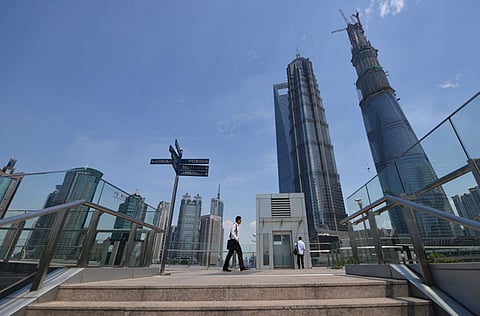China seeks economic boost as data disappoints
Country unveils moves to boost growth, including reducing taxes on small firms, encouraging railway construction and foreign trade incentives

Shanghai: China has unveiled moves to boost growth, including reducing taxes on small firms, as a slowdown in the world’s number two economy shows no sign of abating.
Chinese Premier Li Keqiang announced the measures, including encouraging railway construction and foreign trade incentives, at a cabinet meeting on Wednesday, according to a government statement issued late that evening.
Analysts hailed the moves as a mini-stimulus but investors were unimpressed, sending the stock market down 0.60 per cent on expectations the measures are unlikely to arrest slowing growth.
China’s economy expanded 7.5 per cent year-on-year in the April-June period, slowing from 7.7 per cent in the previous three months, raising worries the world’s second largest economy could be headed for a sharp downturn.
On Wednesday, HSBC’s preliminary purchasing managers’ index for July — a closely watched gauge of manufacturing activity — contracted to an 11-month low.
Among the moves, small firms with monthly sales of less than 20,000 yuan ($3,260) will be exempt from paying turnover tax and value-added tax (VAT) from August 1, the statement said.
“Small businesses... are playing an important role in promoting economic development and market prosperity as well as expanding employment,” it said.
VAT is levied on the difference between a commodity’s retail price and its cost.
The tax exemptions will benefit more than six million small companies, the statement said.
The government will also set up a fund for railway development and keep the yuan’s exchange rate at a “reasonable” level to boost international trade, it said.
Small stimulus
Exporters complain a stronger yuan is hurting their overseas sales by making their products more expensive.
China’s exports slipped 3.1 per cent to $174.32 billion (Dh639.7 billion) in June, according to Customs figures, another sign of a further slowdown in the Asian economic giant.
Lu Ting, an economist with Bank of America Merrill Lynch, called the new policies a “small stimulus”.
“Premier Li’s team has been surely working around the clock to arrest the slowdown,” he wrote in a research note on Thursday.
“These three measures will have limited direct impact on boosting aggregate demand in the short term, but they can surely help boost confidence,” Lu said.
Despite the persistent sluggishness in the domestic economy, China’s finance chief earlier this month ruled out the possibility of introducing any major stimulus this year and said the country would focus on structural reforms.
Stabilising growth
“This year, China will not introduce any large-scale financial stimulus policies but will fine-tune its policies to promote economic growth and employment,” finance minister Lou Jiwei said.
China in 2008 launched a nearly $600 billion stimulus spending package to boost its economy during the depths of the global financial crisis.
“The [latest] move, obviously not a massive stimulus, is aimed at stabilising growth rather than stimulating the economy for a strong rebound,” said Ma Xiaoping, a Beijing-based economist for HSBC.
“It’s incorrect to interpret this as a turnaround in policy,” she said.
In 2011, China launched policies to facilitate financing for small firms and encourage development of private financing.
In late 2012, China’s top economic planner approved around seven trillion yuan ($1.1 trillion) worth of infrastructure projects, including railways and airports.
Sign up for the Daily Briefing
Get the latest news and updates straight to your inbox


